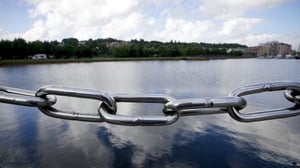How to determine what keywords to use as anchor-text SEO links
By Axia Public RelationsApril 16, 2022
 As you write content (blog posts, stories, and social media posts) with links to external websites, you don’t want long and awkward-looking URLs within your text. Those URLs don’t have to stick out like a sore thumb – you can replace them with anchor text, which is clickable text like this link to our homepage.
As you write content (blog posts, stories, and social media posts) with links to external websites, you don’t want long and awkward-looking URLs within your text. Those URLs don’t have to stick out like a sore thumb – you can replace them with anchor text, which is clickable text like this link to our homepage.
To determine which words to use for ultimate search-engine optimization, you need to make sure your anchor text is expressed briefly and clearly, relevant to the linked page, and specific.
While there isn’t a thorough guide to generating SEO hyperlink words and phrases, in general, use words and phrases that are short, brief, and specific. Here are some questions to ask yourself:
- What is the most concise and accurate way I can write a hyperlink to the linked page?
- What word or phrase would make me want to click on the link?
- How does this linked page relate to my post or story?
There isn’t an exact number of words you should use, either. Instead, keep it as simple as you can, and try not to use more than five words, with one to three words working the best. Get straight to the point in these phrases. Next, choose words that relate to your post and your linked source.
Keyword density is the amount of times a keyword or phrase appears in text. The more the keyword appears, the higher its density is. Having a low keyword density in your content and its link will allow the search engine to understand your intended keywords. Make sure to avoid keyword stuffing: using the same keyword or phrase over and over to rank higher on a page for the term you're using. This form of spamming is not recommended.
Lastly, you want to be specific. If we hyperlinked the words “keyword” or “density” by themselves in the previous paragraph, you wouldn’t know what the linked source entails. That’s why your anchor text must specifically state what the link will talk about. By hyperlinking the entire phrase “keyword density,” we make sure you know the link will elaborate on the meaning of “keyword density.”
Why is this important to know? It might seem that knowing how to find SEO anchor-text phrases only benefits the linked source. However, Google will rank your company’s page higher if the source you hyperlink to is relevant to your website and posts. So, since we’re talking about anchor text in this blog post and I hyperlinked to stories related to anchor text, this post will rank higher on Google because of its relevance to those linked sources. Properly using anchor text gives your story or post more credibility.
If you still have questions about how to optimize SEO keywords/phrases in your anchor text, book a free consultation today.
Photo by Mike from Pexels
Topics: web design & development, owned media, web media

Comment on This Article